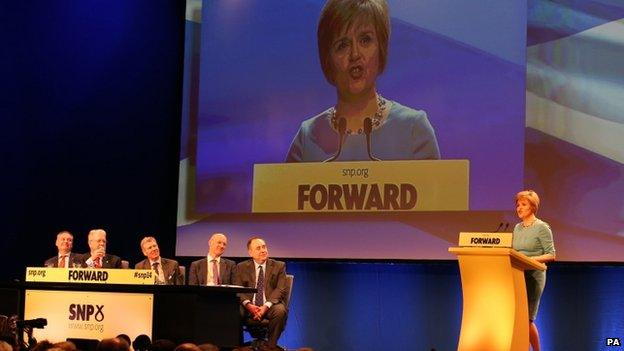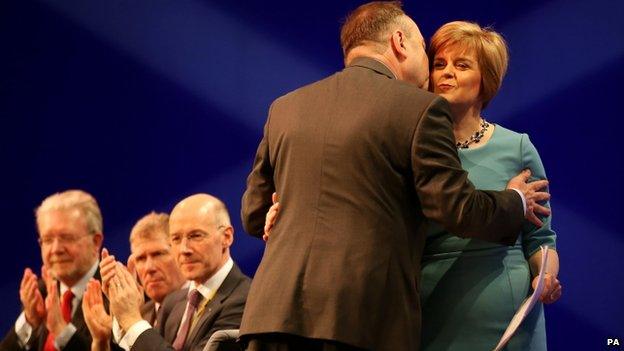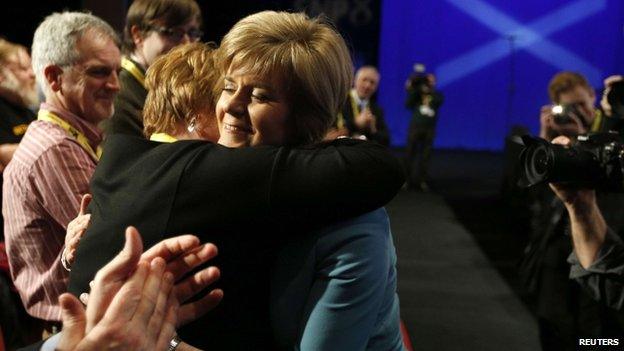SNP conference: Nicola Sturgeon in plea to Labour voters
- Published

Nicola Sturgeon's speech included a plea to Labour voters to say "Yes" in September's referendum
Party conferences, like everything else, have their traditions.
The financial appeal is preceded by painful jokes.
Journalists run a sweep on the duration of the leader's standing ovation.
And keynote speakers always condemn the party's principal opponents in terms both searing and satirical. Said condemnation is greeted with wild applause.
But these are different times, extraordinary times. And so Nicola Sturgeon had come to the SNP conference in Aberdeen in praising mode, rather than with shovel in hand for the purposes of interment.
All her contumely was reserved for the Tories. By contrast, she spoke of Labour with gentle regret. This was not because she defaults to the Left. It was entirely strategic. Put most simply, Labour inclined voters will decide the referendum.
This emerged at several levels in Ms Sturgeon's speech. Firstly, she addressed those who "despite its record, retain a loyalty to Labour". Given that preliminary barb about record, did she then go on to castigate the folly of voting Labour? She did not.
Rather, she developed this into the Scottish mandate argument....
Even when Scotland voted Labour, there was no guarantee of a Labour government at Westminster.
And even when such a government emerged, it might not pursue Scottish priorities.
Then she made it explicit. This was not about asking Labour supporters to abandon the party. It was an offer to help "reclaim" the Labour Party for Scottish voters and Scottish priorities, through independence.

Alex Salmond greets Nicola Sturgeon ahead of her Aberdeen conference speech

Nicola Sturgeon is embraced by her mother Joan after the speech delivered to SNP members
And there was a third level: one which reflects a continuing issue for the Yes side. Ms Sturgeon said: "A vote for independence is not a vote for the SNP. A vote for independence is a vote for democracy."
Yes canvassers still report that they get this on the doorsteps - a reluctance to commit to the SNP, a reluctance to commit to Alex Salmond, a misunderstanding that this referendum might be about entrenching the SNP in power. (I would not be at all surprised to see Alex Salmond emphasise that point himself in his conference speech tomorrow.)
There is a fourth level, expressed in Ms Sturgeon's speech and laid out in the White Paper. It resides in the nature of the offer principally aimed at the dispossessed, at those who need a helping hand as well as at the aspirational working class who remain anxious about their personal household economy.
That pitch is a retail offer. The White Paper envisages a series of questions being posed by the voters to those who advocate independence. Most striking, perhaps, is the question: "What will independence deliver for me?"
Does the White Paper reply dwell upon a written constitution? Does it speak of NATO and the EU? Is it replete with references to the philosophical concept of independence? What do you think? Good answer.
Pitch to persuade
Rather it offers better childcare, lower energy bills, guaranteed pensions and enhanced welfare benefits. That is not to say that the items listed above are unimportant or neglected in the debate. It is simply to recall what the White Paper envisages as the primary reply to voters concerned about their own prospects.
Why Labour voters? Why not Conservative or Liberal Democrat? Because Labour has more support in Scotland and those who identity with Tory or LibDem are, mostly, already fixed upon No - although there are exceptions. Those who identify with the SNP are, overwhelmingly, voting Yes - although there are exceptions.
To stress, again, these sectors are not being neglected by either side. Far from it. But the referendum will be decided by the undecided. By those who have yet to make up their minds. And, again, both sides reckon that these potential voters are often Labour inclined. Hence the pitch to persuade them, to win them to either side.
Note Labour "inclined". By definition, many of them will have voted for the SNP in 2011 when the Nationalists won an overall majority at Holyrood. But, over the longer term, they are Labour identifiers. Labour inclined.
At an election, it is the task of the Nationalists to turn these identifiers into SNP voters. In a one-off referendum, it is the objective of the SNP to urge such identifiers to lend their support to independence - without abandoning or overturning that fundamental inclination. Hence, the empathy from Nicola Sturgeon for those who identify with Labour, however misguided she might regard it. Hence, the nature of her retail offer.
It will be the task of Better Together, more precisely Labour's task, to persuade their identifiers to stick with the Union, to persuade them that their wishes can be achieved, their priorities delivered via the UK.
Your referendum, your choice.